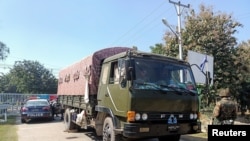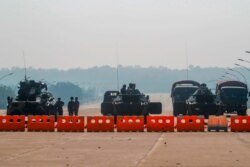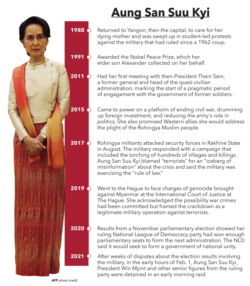Myanmar’s National League for Democracy called Tuesday for the release of de facto leader Aung San Suu Kyi, President Win Myint and other party leaders.
The statement posted on Facebook comes a day after the military seized control of the country while detaining senior politicians.
Streets were quiet Tuesday, with phone and internet services running again and banks reopened.
The military said its seizure, set to last one year, was necessary because the government had not acted on claims of voter fraud in November elections that were overwhelmingly won by the NLD. A new session of parliament had been due to begin Monday.
International expressions of concern about the military’s action were widespread, with multiple governments urging the military to respect the democratic process and release the detained officials. U.S. President Joe Biden threatened to impose sanctions.
“The United States will stand up for democracy wherever it is under attack,” Biden said in a statement.”
UN to hold emergency meeting
The United Nations Security Council is scheduled to hold an emergency meeting Tuesday to discuss the situation in Myanmar.
Britain’s Ambassador to the U.N. Barbara Woodward, who this month holds the council’s rotating presidency, said the Security Council will examine “a range of measures” to uphold the November election and secure the release of Aung San Suu Kyi and the other detainees.
U.N. human rights chief Michelle Bachelet said in a statement there are “deep fears of a violent crackdown on dissenting voices” in Myanmar and called on the military to avoid using unnecessary force.
“I urge the international community to stand in solidarity with the people of Myanmar at this time, and for all states with influence to take steps to prevent the crumbling of the fragile democratic and human rights gains made by Myanmar during its transition from military rule,” Bachelet said.
Before the coup
Monday’s developments followed months of tensions linked to the November elections. Myanmar’s military said there had been voter fraud, an allegation rejected by the country’s election commission.
On Saturday, the Tatmadaw, the official name of Myanmar’s military, released a statement arguing that voter fraud had taken place and the international community “should not be endorsing the next steps of the political process on a ‘business as usual’ basis.”
“The Tatmadaw is the one pressing for adherence to democratic norms,” the statement read. “It is not the outcome itself of the election that the Tatmadaw is objecting to. …Rather, the Tatmadaw finds the process of the 2020 election unacceptable, with over 10.5 million cases of potential fraud, such as nonexistent votes.”
The arrest of leaders in Myanmar, also known as Burma, is just the latest event in a country that has struggled between civilian and military rule and raises concerns that the nation’s transition to a democracy has stalled.
Myanmar history
A British colony until 1948, Myanmar was ruled by dictators backed by the military from 1962 to 2010.
An uprising in 1988 pushed for an election in 1990, which the NLD party won in a landslide, but the elected members of parliament were imprisoned, and the dictatorship continued.
Aung San Suu Kyi, the daughter of Myanmar's independence hero, General Aung San, who was assassinated in 1947, emerged as a leader in the pro-democracy rallies and in the NLD. She was awarded the Nobel Peace Prize in 1991 while under house arrest.
In 2010, Senior General Than Shwe announced the country would be handed over to civilian leaders, who included retired generals. They freed political prisoners, including the lawmakers from the National League for Democracy, and Aung San Suu Kyi, who was elected in a 2012 by-election and later became the state counsellor of Myanmar.
But Aung San Suu Kyi, 75, while popular among Myanmar’s Buddhist majority, has seen her international reputation decline over her government’s treatment of the country's mostly Muslim Rohingya minority.
In 2017, an Army crackdown against the Rohingya, sparked by deadly attacks on police stations in Rakhine state, led hundreds of thousands of Rohingya to flee to neighboring Bangladesh. The International Criminal Court is investigating the country for crimes against humanity.








